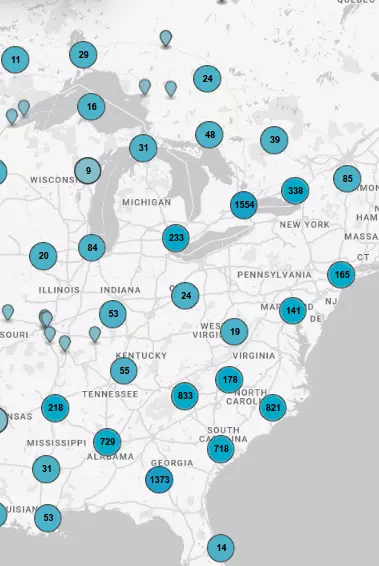The Headless Horseman Bridge
THE HEADLESS HORSEMAN BRIDGE DESCRIBED BY IRVING IN THE LEGEND OF SLEEPY HOLLOW FORMERLY SPANNED THIS STREAM AT THIS SPOT Submitted by @RoadTripNE
- new york
- sleepy hollow
- irving
- headless
St. Peter Catholic Church
St. Peter's was founded in 1840, the first Roman Catholic Parish in West Tennessee and given to the Dominican Order in 1846. The present church was built 1852-1855 around a smaller church which...
- shelby county
- tennessee
Shelby County
Established 1819; named in honor of Isaac Shelby who, along with Andrew Jackson, was appointed United States Commissioner; together they arranged the purchase of the Western District from...
- shelby county
- tennessee
Tennessee Williams
In the spring of 1935 while visiting his grandparents, the Rev. and Mrs. Walter F. Dakin, at 1917 Snowden, Tennessee Williams first encountered Chekhov in Southwestern's library, and wrote his...
- shelby county
- tennessee
Piggly Wiggly
With a brass band, a beauty contest, flowers for the ladies, and balloons for the children, Clarence Saunders of Memphis opened the first Piggly Wiggly, America's first completely self- service...
- shelby county
- tennessee
Sun Records
In the early 1950's Sun Records was a small recording studio located here at 706 Union. Owned and operated by Sam C. Phillips, Sun Records became nationally known for giving many local...
- shelby county
- tennessee
Tennessee Williams First Performance
On the evening of July 12, 1935, in the garden behind this house, the Garden Players under the direction of Arthur Scharff performed Tennessee Williams' first staged play "Cairo,...
- shelby county
- tennessee
Sultana Memorial
In memory of those who died on the ill-fated passenger steamer Sultana On April 27, 1865, just north of Memphis, the luxury steamer Sultana's massive boilers exploded. The disaster claimed over...
- shelby county
- tennessee
Rosengarten's Store
Beginning in 1928, Louis Rosengarten built and operated this red brick general store. Mr. and Mrs. A.E. Frysen ran the store from 1942 to 1969. Later the structure was joined to the...
- shelby county
- tennessee
The First Lee House
Built in 1869 by James Lee, Jr. (1832-1905), lawyer, riverman and leader in the development of Memphis, the first Lee House was designed by architect Joseph Willis. In this home...
- shelby county
- tennessee
The First Railroad in West Tennessee
The LaGrange and Memphis Railroad Organized in 1835, the LaGrange and Memphis Railroad operated the first train from Memphis 4 1/2 miles on March 29, 1842, on the present roadbed of the...
- shelby county
- tennessee
The Hole in the Wall
Cousins Tony Angelos and Charles Skinner emigrated from Greece together and opened �The Hole in the Wall� cafe behind the old Peabody Hotel in 1911. In 1923, they opened the Bon Ton Cafe,...
- shelby county
- tennessee
The Shrine Building
The 10th through 12th floors of the Shrine Building held the headquarters of the Al Chymia Shrine Temple from 1923 to 1936, and the Shriners' logo is still etched above the door. The...
- shelby county
- tennessee
The Wigfall Grays4th Tennessee Infantry Company C
On April 15, 1861, eighty men from Collierville organized the Wigfall Grays to oppose President Lincoln's call for volunteers to invade the South. The company was named in honor of Senator Louis...
- shelby county
- tennessee
Tom Brooks Park
Herbert Thomas Brooks served in community leadership roles for over 50 years. His leadership and vision affected almost every facet of the community and can be seen in the physical beauty of...
- shelby county
- tennessee
Workingman's Hall
BERKELEY HISTORY WORKINGMAN’S HALL 1879 Originally located at Sixth and Delaware streets, this simple wooden building was constructed by volunteers from the Workingman’s Club, a west Berkeley...
- berkeley
- california
- bay area
- workingman
- 1879
- 1882
Ennor’s Restaurant Building
CITY OF BERKELEY LANDMARK designated in 2006 Ennor’s Restaurant Building James W. Plachek, Architect John P. Brennan, Builder, 1923 This reinforced concrete building with its articulated brick...
- berkeley
- california
- bay area
- plachek
- brennan
Thomas Alva Edison
In 1865-66 Edison was military telegraph operator with the Federal occupation army, working in a building formerly at the east corner of North Court and November 6 Streets, and boarding next door....
- shelby county
- tennessee
U.S. Supreme Court Rules On Overton Park and I-40
In 1971, the U.S. Supreme Court ruled that the State of Tennessee could not go through Overton Park to build I-40 based on environmental issues. This east-west interstate now follows I-240...
- shelby county
- tennessee
Union Avenue
Contrary to popular belief, Union Avenue's name has nothing to do with the Civil War. The street was the southern boundary of Memphis until 1850, when the city consolidated with the rival city...
- shelby county
- tennessee
